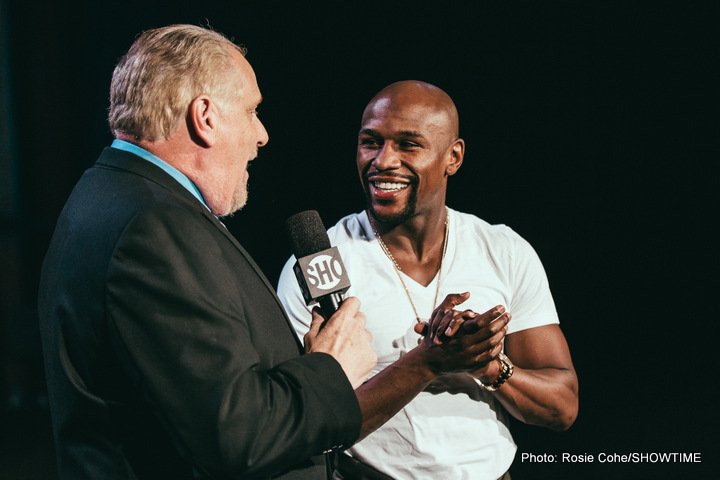
By Alden Chodash: At 50-0 (27 KOs) and having won titles in five different weight divisions, Floyd Mayweather retired leaving little doubt as to who the best fighter of his generation was. The self-proclaimed “TBE” (the best ever), Mayweather cemented his legacy with dominant victories over the likes of Genaro Hernandez, then top 5 pound-for-pound Diego Corrales, Zab Judah, Oscar De La Hoya (despite Tom Kaczmarek’s scorecard), Shane Mosley, Miguel Cotto, Canelo Alvarez, and Manny Pacquiao.
Whether or not Mayweather is in fact one of the best in boxing history is a difficult assessment to make, as many would be quick to point out that the likes of Harry Greb, Sugar Ray Robinson, and “Hammerin Hank” Armstrong each beat 10 or more hall of famers back when fighters could be in the ring as much as twice a month. This is not the point of the analysis. What is significant is how Mayweather revolutionized the way stardom could be achieved in boxing.
Mayweather is by no means the first skilled boxer to stand as the sport’s top attraction. Jack Johnson, though almost universally unpopular at the time, drew the sport’s then biggest gate in his one-sided beatdown of former champion Jim Jeffries. Sugar Ray Robinson ruled the sport for much of the 40’s and the 50’s with his dazzling quickness. Muhammad Ali, inspired by Robinson’s craft, followed in his footsteps and became perhaps the most colorful fighter in boxing history. And in more recent history, Sugar Ray Leonard and Roy Jones used their tremendous talent and boxing skills to mesmerize fight fans for a period. However, all of the above allowed either the push for theater or the brutal longevity of the sport itself to get the better of them. Johnson, who lost his world heavyweight title in 26 rounds of sweltering Havana heat, continued to fight until age 60 where he was stopped in 3 of his last 7 fights. Robinson’s career also extended more than a decade after his best was behind him, finally retiring following a decisive loss to Joey Archer in 1965. While Ali’s career also extended significantly past his prime, “The Greatest” took far more punishment in the second (post Vietnam) phase of his career than he had to, taking hellacious beatings against the ropes against the likes of Joe Frazier in Manila and Earnie Shavers, to name a few. Whether his “Rope-a-Dope” tactics were due to diminishing ability with age or a desire to please his fans (or both), doctors believe the resulting head trauma he suffered may have contributed to Ali’s early onset of Parkinson’s Syndrome. The pattern continued with Leonard, as a brilliant talent who had the natural talent to get out of the sport relatively unscathed ended up retiring following beatings against Terry Norris and Hector Camacho. As a sport, we can only hope Roy Jones gets out sooner than later, as the former pound-for-pound kingpin has been reduced to a stepping stone for the likes of Denis Lebedev, Danny Green, and Enzo Maccarinelli.
What made Mayweather unique is that he was able to achieve and maintain stardom without feeling compelled to take on the same risks that led Leonard, Robinson, and Ali to win the hearts of thousands of sports fans. Quite frankly, aside from true boxing fans who appreciate the art that Floyd showcases, Mayweather may not have even won the hearts of hundreds of casual fans who equate excitement with the kind of blood-and-guts drag-out fights that Mayweather strategically avoided. While Mayweather was once more engaging while he built a name for himself against the likes of Jesus Chavez, Emmanuel Burton, DeMarcus Corley, and Phillip N’Dou, he began to increasingly rely on his impenetrable defense, footwork, and pot-shots to rack up a string of one-sided victories against heavier and more dangerous opposition. And while Mayweather has officially “retired” three times, he has yet to let the sport retire him, as was the case for the great Muhammad Ali, Ray Robinson, Ray Leonard, and may inevitably be the case for Roy Jones.
The precedent Mayweather set for a relatively safe path towards boxing superstardom is unique and can hopefully resonate amongst today’s youth in the professional and amateur boxing realm. While boxing rules have evolved in response to tragic events such as Earnie Schaaf and Duk-Koo Kim (medical suspensions for fighters losing by KO/TKO and limiting bouts to 12 rounds), unfortunately the sport still sees plenty of fallen warriors such as Gerald McClellan, Jimmy Garcia, Leavander Johnson, and Magomed Abdusalamov; all of whom were ultimately too brave for their own good. The Mayweather legacy will hopefully help preclude such situations by inspiring future generations to make a name for themselves without taking excessive punishment.
It’s not to say that all fighters need to do their best to replicate Mayweather’s style in order to share the same success, but the fact that history now has a fighter who set live gate and PPV records despite avoiding risks in his superfights has created a brand new avenue towards superstardom. If any of Mayweather’s accomplishments should create the longest lasting impact on the sport, it should be this.